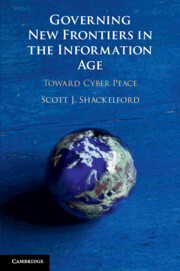Book contents
- Governing New Frontiers in the Information Age
- Governing New Frontiers in the Information Age
- Copyright page
- Dedication
- Epigraph
- Contents
- Figures
- Tables
- Foreword
- Preface
- Acknowledgments
- Abbreviations
- Part I Understanding Cybersecurity and Other Collective Action Challenges in the Information Age
- 1 Governance at the Frontiers of International Relations
- 2 Managing Cyber Attacks as a Global Collective Action Problem
- Part II Security and Environmental Threats Facing the Frontiers: Case Studies in Commons Management and their Application to Cybersecurity and Internet Governance
- Part III Governing New Frontiers in the Information Age
- Conclusion
- Book part
- Index
2 - Managing Cyber Attacks as a Global Collective Action Problem
from Part I - Understanding Cybersecurity and Other Collective Action Challenges in the Information Age
Published online by Cambridge University Press: 13 March 2020
- Governing New Frontiers in the Information Age
- Governing New Frontiers in the Information Age
- Copyright page
- Dedication
- Epigraph
- Contents
- Figures
- Tables
- Foreword
- Preface
- Acknowledgments
- Abbreviations
- Part I Understanding Cybersecurity and Other Collective Action Challenges in the Information Age
- 1 Governance at the Frontiers of International Relations
- 2 Managing Cyber Attacks as a Global Collective Action Problem
- Part II Security and Environmental Threats Facing the Frontiers: Case Studies in Commons Management and their Application to Cybersecurity and Internet Governance
- Part III Governing New Frontiers in the Information Age
- Conclusion
- Book part
- Index
Summary
This chapter opens with a brief typology of cyber conflict encapsulating cybercrime, espionage, war, and terrorism. The examination then moves on to investigate first how and why these categories are breaking down in the Information Age, and second what comparative approaches to regulating cyberspace and managing cyber conflict exist as juxtaposed against other global collective action problems. The tragedy of the unmanaged commons scenario, from which many collective action problems derive, predicts the overexploitation of common pool resources and has, traditionally, been moderated by three management solutions: privatization, nationalization, and common property legal regimes. Accordingly, this chapter introduces each of these concepts and reflects on the potential and limits of these approaches, including the CHM concept that was introduced to govern the deep seabed and the Moon as applied to cyberspace. The debate is then viewed through the lens of polycentric governance generally as well as through an introduction to a range of leading institutional design frameworks, including the Ostrom Design Principles, which are in turn applied to the case studies in Part II.
Keywords
- Type
- Chapter
- Information
- Governing New Frontiers in the Information AgeToward Cyber Peace, pp. 87 - 172Publisher: Cambridge University PressPrint publication year: 2020



